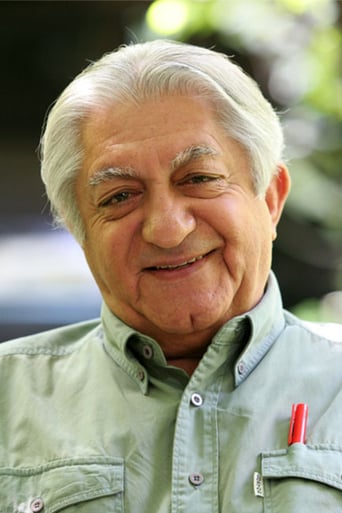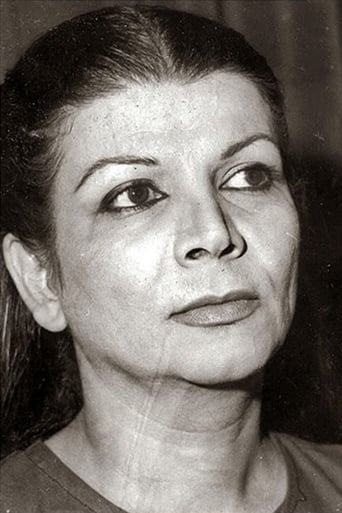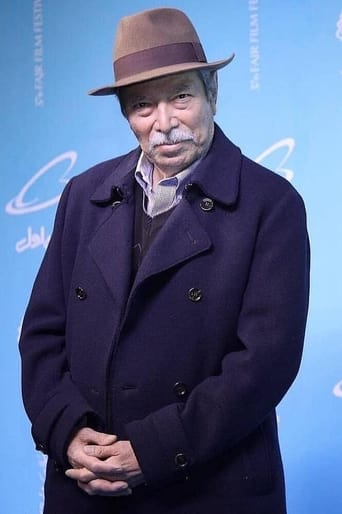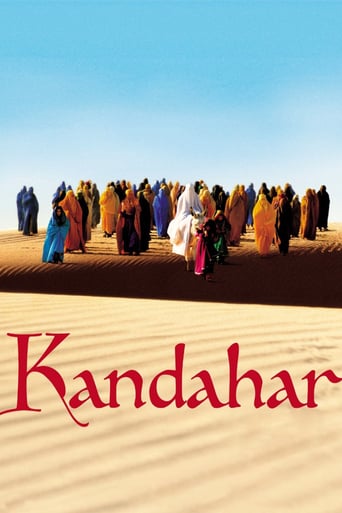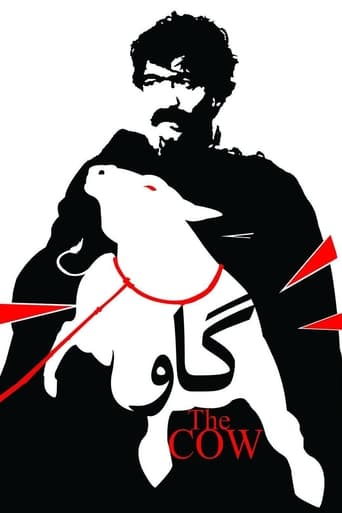
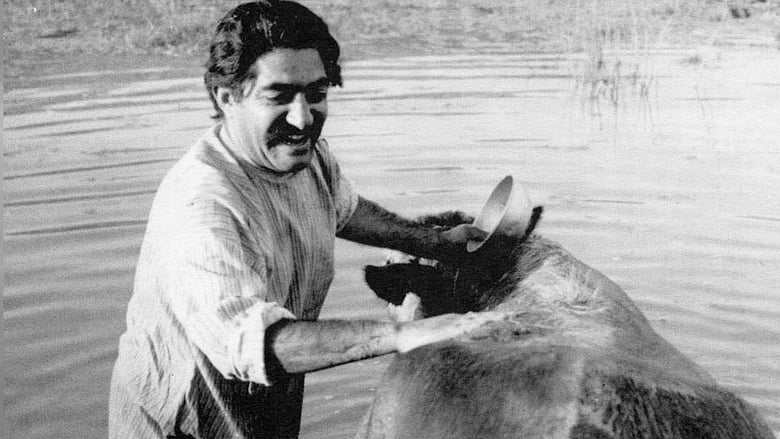
The Cow (1969)
An old villager deeply in love with his cow goes to the capital for a while. While he's there, the cow dies and now the villagers are afraid of his possible reaction to it when he returns.
Watch Trailer
Cast


Similar titles
Reviews
The title of this Iranian film made it really obvious what the story would involve, but not necessarily in the way you would expect, I found it listed in the book 1001 Movies You Must See Before You Die, and I hoped it would be worth it. Basically in a remote and desolate village, middle-aged villager Masht Hassan (Ezzatolah Entezami) has a close relationship with his cow, the only one in the village, Hassan is married, but has no children. When Hassan goes away for a short time, the villagers look after his beloved and pregnant cow, but they find it dead. Knowing how much Hassan cherishes the cow, the villagers fear his reaction when he returns, so they decide to cover up the death and dispose of the corpse. When Hassan returns, they have covered up all evidence of the death, and they lie to him, telling him that the cow ran away. Hassan is unconvinced that his cow would ever run away, he is devastated and finds great difficulty in confronting by his loss, and the loss of livestock affects his social stature in the village. Hassan starts to spend more time in the barn, his grieving pushes him over the edge, and he has a nervous breakdown. Hassan goes insane and has developed boanthropy, a psychological disorder in which he believes himself to be a bovine, in other words, he believes he is the cow. Hassan has incorporated many cow-like mannerisms, including walking on his hands and knees, and eating hay, and the villagers cannot snap him out of it. In the end, his wife (Mahin Shahabi) and the villagers try a drastic method to cure his insanity, tie him up and drag him up a hill, it ends in tragedy when he runs away, and he falls to his death. Also starring Jamshid Mashayekhi as Abbas, Ali Nassirian as Islam, Khosrow Shojazadeh as Boy and Jafar Vali as Kadkhoda. I can see why this is considered an influential film, apparently it was banned as well, it is a very simple story, with themes of poverty, superstition and paranoia, it is both strange and fascinating to watch, a terrific drama. Very good!
What was already, from the outset, a village life tale carrying some atmosphere and menace in the form of the three silhouetted figures of thieves from a neighbouring village, becomes a genuinely unsettling film when we begin to view events not through the protagonist but through those around him. This shift in point-of-view is done so matter-of-factly so as to invoke a vague anticipation of something more supernatural that is constantly at odds with the film's overall realism: suddenly denied internal access, we're never quite sure whether or not Hassan genuinely believes he is a cow, for instance, or whether the cow is even dead, even though we've seen the narrative events leading to this... At one point, there's a genuinely disturbing visual suggestion that Hassan has indeed begun to transmogrify into cattle, when the three neighbouring thieves come to steal the cow in the night, only to find it is its owner, lying in weird lighting. Events unfold against a vivid sense of community and what this livestock means.Join idFilm: idfilm.proboards.com
This movie is about as far as one can get from Hollywood blockbusters. Its about a cow. About a cow and a very loving owner. And what happens to them ultimately. There's melancholy and madness in the tragic ending. But the movie also scales new heights in the bonding between human and animals, in this case, a cow. The camera has been used is a surreal way. Shadows and people mix creating a spookiness which adds to the oddity of the general environment depicted. There's very palpable tension in the movie, created by the elements related to the cow and the three shadowy thieves who perhaps symbolize lawlessness. What also struck me was the looming silence of the black burkah-clad women and occasion glimpses of their crinkly faces. All very surreal. There are some very interesting personalities which come alive through the script, other than the cow of course!
The Cow, Gaav (1969) is the second feature film by director Dariush Mehrjui. It was the second film to be financed by the Shah of Iran but promptly banned after completion when the Shah felt its portrayal of simple village life in Iran gave the wrong impression to outsiders. The film was smuggled out of Iran in 1970, and subsequently won "critics choice" at the Venice Film Festival.The Cow (originating from a novel by Iranian author Gholam-Hossein Saedi) portrays the obsession, loss of faith and demise of a poor rural village that loose their single salable commodity - a cow. Hassan, played by Ezatollah Entezami (who received best actor at the Chicago Film Festival), has a face that vividly captures his physical and emotional change after a breakdown when he becomes the cow. Mehrjui uses theater actors with "compelling faces" as key elements in the cinematography (Feridun Ghovanlu), as did the Italian Neo-realist.The film explores the looming fear of a foreign invader as the villagers come to believe Hassan, in his cow-like state, will be captured in cross-border raids from rival tribes. Politically this is reminiscent of the Shah's constant allusions to the neighboring "Arab threat" over oil. While set in traditional, rural Iran, Mehrjui shows an alternative view of Iran where collective fear and poverty can cycle in hopeless desperation. Viewers of The Cow are left to question the very root of human dignity.


